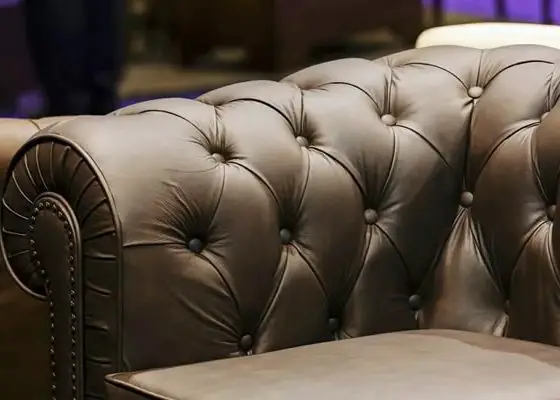Softness is a major consideration when shopping for bed sheets, and some types stand out for their exceptional texture. Understanding your options is important when deciding which fabric meets your bedding needs best.
1. Percale Weave – Affordable But Prone to Wrinkling
Percale is a type of weave made from 100% cotton and will wrinkle unless you purchase wrinkle-free treated sheets. The typical percale thread count (TC) for softness is between 180TC to 400TC. Any higher thread count will produce a thicker fabric, but the softness may be significantly less. Most percale bed sheets are made from regular cotton with fibers that are only one inch long; however, longer cottons, such as pima, can be used for this weave.
- Pros: This weave is tight but does provide a soft yet crisp finish. It is a cheaper cotton choice than Egyptian or Pima cottons.
- Cons: Percale is made from short cotton fibers, and although the finish is soft, it also has a crisp finish that isn’t as soft other weaves usually found in pima or Egyptian cottons.
2. Egyptian Cotton – Strong and Soft
Egyptian cotton is a long staple (1 ½ inches) and a very strong fiber. The one-ply bed sheets made with Egyptian cotton are usually very soft. However, if the fabric is made with two-ply or three-ply threads (two or three threads twisted together to form a single thread), then you may get a higher thread count. However, in this case, the density of the ply threads will cause the fabric to be thicker and stiffer. One-ply 600TC Egyptian cotton bed sheets will be softer than a two-ply 1200TC set.
- Pros: Egyptian cotton is classified as a luxury bed sheet. The bedding is usually soft and comfortable. This fiber tends to get softer after several washings. Compared to Percale sheets, Egyptian cotton sheets are typically much softer.
- Cons: A high thread count with two- or three-ply fibers will create very stiff sheets.
3. Pima and Supima® Cotton – Soft and Durable
Supima® is a trademark of the Supima Association that stands for Superior Pima. Not all pima sheets are this brand. Pima cotton has a long staple (1 ½ inches). Woven into sheets, Pima produces soft bedding that many people find ideal. A Pima 400TC constructed in a dense weave, such as percale, is a great choice for softness and durability.
- Pros: Pima cotton produces a soft bed sheet, since it is a longer staple. One-ply bed sheets will be softer than two-ply or three-ply options. These sheets are softer than percale sheets that are made from regular cotton.
- Cons: Laundering with detergent can cause a build-up that diminishes the fabric softness. Using baking soda in the wash with a vinegar rinse cycle can help remove the build-up.
4. Bamboo – Soft Unless Processed Harshly
Organic bamboo is a better choice than non-organic bamboo if you wish to take advantage of this fiber’s beneficial properties. The bamboo fiber is very strong and makes durable bed sheets.
- Pros: Bamboo is often advertised as an alternative to cotton sheets, and some claim they are softer than the best cotton sheets.
- Cons: The quality of softness in bamboo bed sheets can diminish when chemicals are used when the fabric is processed or dyed. Instead of the expected softness, the sheets can be coarse and stiff.
5. Silk – Luxurious and Smooth
Silk is often described as the epitome of luxury and softness. Choose a 400 TC bed sheet set for an ultra-sleeping experience. Silk has a smooth and lustrous sheen that is quickly identifiable. Silk bedding can be lightweight or fairly heavy, such as a 400TC sheet.
- Pros: Silk is considered the ultimate super soft bedding. It has great tactile appeal.
- Cons: Silk requires extra care in laundering, such as gentle cycles, no fabric softeners, and no harsh detergents. Many manufacturers recommend dry cleaning or laundering by hand. Some people find the super softness of silk bed sheets makes this fabric too slippery for a comfortable sleeping material.
6. Microfiber – Inexpensive and Soft
Microfiber is woven from man-made yarns, nylon and polyester. You may prefer a brushed microfiber that is very soft. This fabric is light-weight but highly durable.
- Pros: These inexpensive bed sheets deliver a softness that isn’t easy to find in cheaper bed sheets.
- Cons: Laundering requires special attention, such as gentle cycle and no harsh detergents. Microfiber bed sheets aren’t as soft as silk.
7. Flannel – Soft But Prone to Pilling
Flannel sheets are made from 100% cotton (often long staple cotton) and are made using a looser weave than typical cotton bed sheets. Flannel sheets are heavier than most sheets. You may prefer a brushed flannel that is very soft to the touch.
- Pros: Flannel, especially brush flannel is very soft and often used for crib bed sheets to protect sensitive newborn skin.
- Cons: Flannel sheets can shed or pill causing it to lose softness over time.
Choosing the Softest Bed Sheets
There are many pluses and minuses for each bedding choice when shopping for the softest types of bed sheets. You must decide the texture and type of fabric that best fits your bedding needs.



